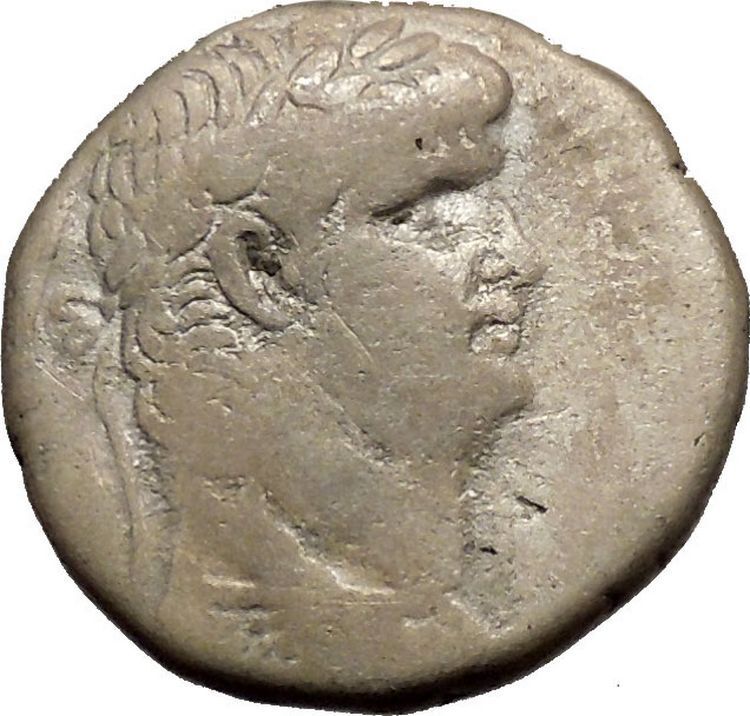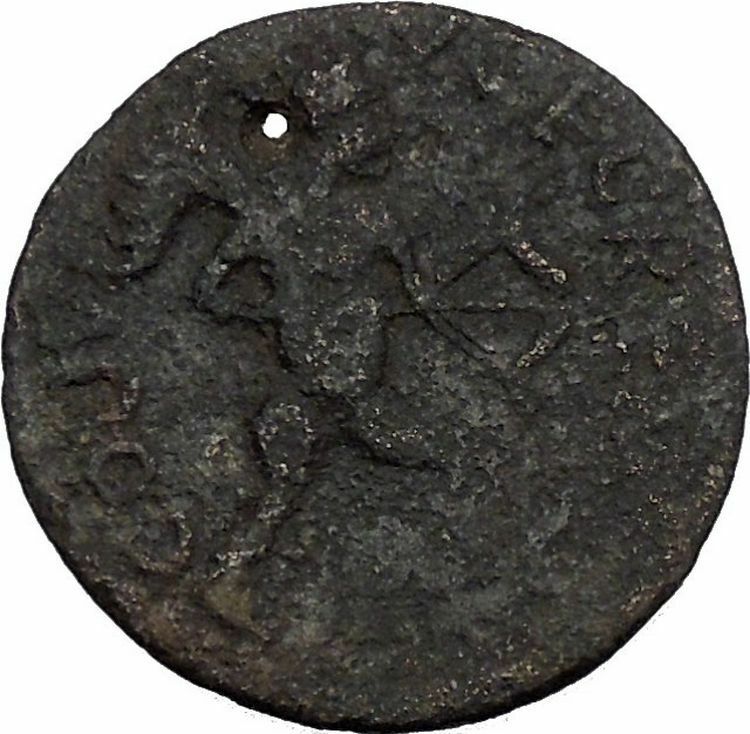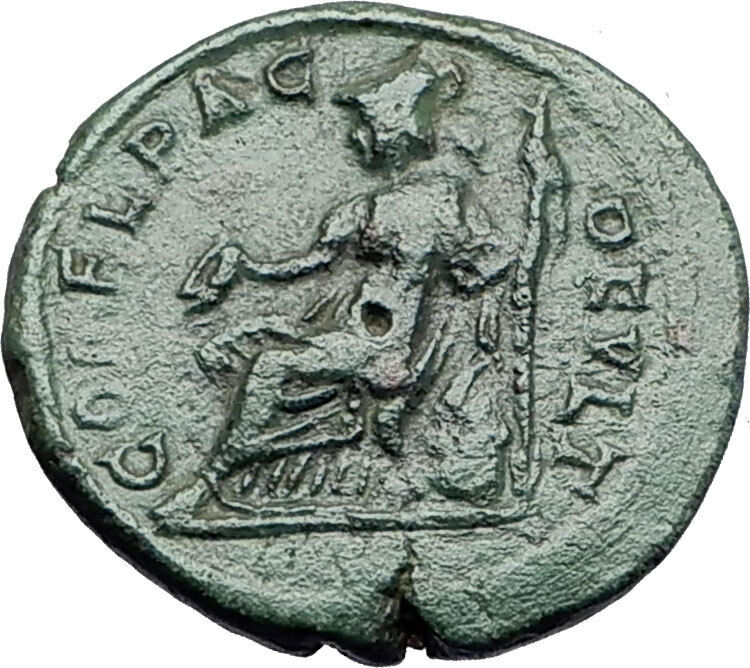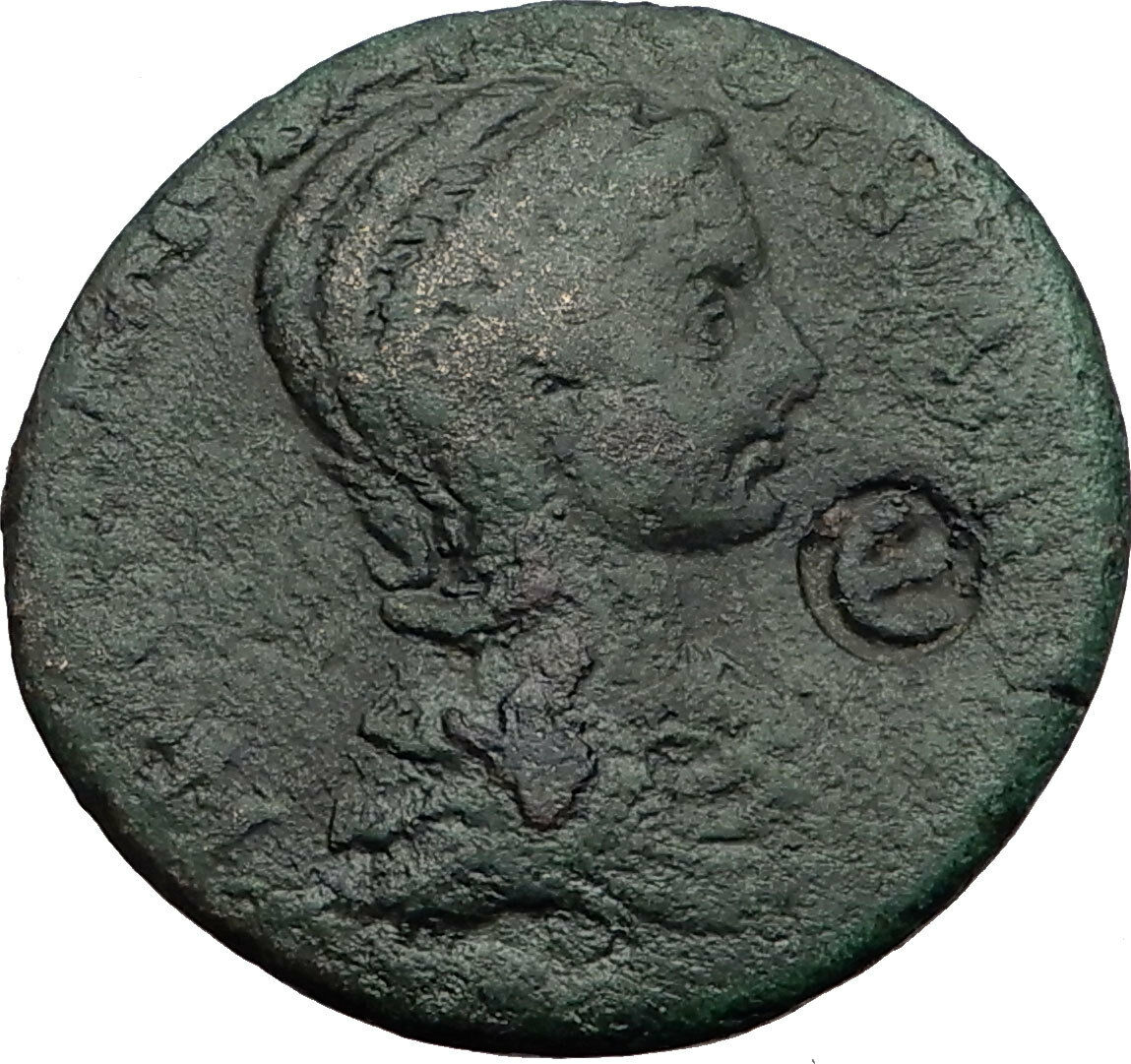|
Gallienus – Roman Emperor: 253-268 A.D. –
Medallic Bronze 36mm (14.48 grams) of Antioch-ad-Maeandrum, Caria
Reference: SNG von Aulock 2430 (var.); Similar Coin Sold in Numismatik Lanz München
Auction 149 #518 (2,600 EUR, approx. 3,182 USD)
Certification: NGC Ancients VF 4375823-057
AV KA ΠΟ Γ AΛΛI HNOC, Helmeted & cuirassed bust left, holding shield & spear.
ANTIOX EΩΝ, six-arched bridge with guard rails across the Maeander River; triple-bayed triumphal arch at one end; On the bridge the river God Mäander with filling horn in the arm on a Kline stores; stairway on the left side, on which a stork sits.
After the defeat of Valerian I by the Persians, the autocrat, Gallienus won the bridge over the Maeander River, which was very important for supplies on the eastern front.
The Maeander River, is a river in southwestern Turkey. It rises in west central Turkey near Dinar before flowing west through the Büyük Menderes graben until reaching the Aegean Sea in the proximity of the ancient Ionian city Miletus. The word “meander” is used to describe a winding pattern, after the river.
You are bidding on the exact item pictured, provided with a Certificate of Authenticity and Lifetime Guarantee of Authenticity.
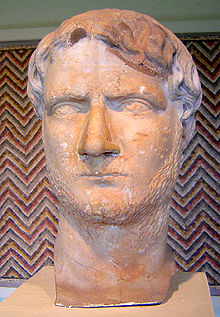 Gallienus – Roman Emperor: 253-268 A.D. Gallienus – Roman Emperor: 253-268 A.D.
( 253-260 A.D. with Valerian I | 260 A.D. with Valerian I and Saloninus | 260-268 A.D. sole reign )
Son of Valerian I and Mariniana | Husband of Salonina | Father of Valerian II and Saloninus
Gallienus (Latin: Publius Licinius Egnatius Gallienus Augustus; c. 218 – 268) was Roman Emperor with his father Valerian from 253 to 260 and alone from 260 to 268. He ruled during the Crisis of the Third Century that nearly caused the collapse of the empire. While he won a number of military victories, he was unable to prevent the secession of important provinces.
Life
Gallienus spent most of his time in the provinces of the Rhine area (Germania Inferior, Germania Superior, Raetia, and Noricum), though he almost certainly visited the Danube area and Illyricum during 253 to 258. According to Eutropius and Aurelius Victor, he was particularly energetic and successful in preventing invaders from attacking the German provinces and Gaul, despite the weakness caused by Valerian’s march on Italy against Aemilianus in 253. According to numismatic evidence, he seems to have won many victories there, and a victory in Roman Dacia might also be dated to that period. Even the hostile Latin tradition attributes success to him at this time.
In 255 or 257, Gallienus was made Consul again, suggesting that he briefly visited Rome on those occasions, although no record survives. During his Danube sojourn (Drinkwater suggests in 255 or 256), he proclaimed his elder son Valerian II Caesar and thus official heir to himself and Valerian I; the boy probably joined Gallienus on campaign at that time, and when Gallienus moved west to the Rhine provinces in 257, he remained behind on the Danube as the personification of Imperial authority.
Sometime between 258 and 260 (the exact date is unclear), while Valerian was distracted with the ongoing invasion of Shapur in the East, and Gallienus was preoccupied with his problems in the West, Ingenuus, governor of at least one of the Pannonian provinces, took advantage and declared himself emperor. Valerian II had apparently died on the Danube, most likely in 258. Ingenuus may have been responsible for that calamity. Alternatively, the defeat and capture of Valerian at the battle of Edessa may have been the trigger for the subsequent revolts of Ingenuus, Regalianus, and Postumus. In any case, Gallienus reacted with great speed. He left his son Saloninus as Caesar at Cologne, under the supervision of Albanus (or Silvanus) and the military leadership of Postumus. He then hastily crossed the Balkans, taking with him the new cavalry corps (comitatus) under the command of Aureolus and defeated Ingenuus at Mursa or Sirmium.The victory must be attributed mainly to the cavalry and its brilliant commander. Ingenuus was killed by his own guards or committed suicide by drowning himself after the fall of his capital, Sirmium.
In the years 267–269, Goths and other barbarians invaded the empire in great numbers. Sources are extremely confused on the dating of these invasions, the participants, and their targets. Modern historians are not even able to discern with certainty whether there were two or more of these invasions or a single prolonged one. It seems that, at first, a major naval expedition was led by the Heruli starting from north of the Black Sea and leading in the ravaging of many cities of Greece (among them, Athens and Sparta). Then another, even more numerous army of invaders started a second naval invasion of the empire. The Romans defeated the barbarians on sea first. Gallienus’ army then won a battle in Thrace, and the Emperor pursued the invaders. According to some historians, he was the leader of the army who won the great Battle of Naissus, while the majority believes that the victory must be attributed to his successor, Claudius II.
In 268, at some time before or soon after the battle of Naissus, the authority of Gallienus was challenged by Aureolus, commander of the cavalry stationed in Mediolanum (Milan), who was supposed to keep an eye on Postumus. Instead, he acted as deputy to Postumus until the very last days of his revolt, when he seems to have claimed the throne for himself. The decisive battle took place at what is now Pontirolo Nuovo near Milan; Aureolus was clearly defeated and driven back to Milan. Gallienus laid siege to the city but was murdered during the siege. There are differing accounts of the murder, but the sources agree that most of Gallienus’ officials wanted him dead. According to the Historia Augusta, an unreliable source compiled long after the events it describes, a conspiracy was led by the commander of the guard Aurelius Heraclianus and Marcianus.
Cecropius, commander of the Dalmatians, spread the word that the forces of Aureolus were leaving the city, and Gallienus left his tent without his bodyguard, only to be struck down by Cecropius.One version has Claudius selected as Emperor by the conspirators, another chosen by Gallienus on his death bed; the Historia Augusta was concerned to substantiate the descent of the Constantinian dynasty from Claudius, and this may explain its accounts, which do not involve Claudius in the murder. The other sources (Zosimus i.40 and Zonaras xii.25) report that the conspiracy was organized by Heraclianus, Claudius, and Aurelian.
According to Aurelius Victor and Zonaras, on hearing the news that Gallienus was dead, the Senate in Rome ordered the execution of his family (including his brother Valerianus and son Marinianus) and their supporters, just before receiving a message from Claudius to spare their lives and deify his predecessor.
|








 Gallienus – Roman Emperor: 253-268 A.D.
Gallienus – Roman Emperor: 253-268 A.D.

